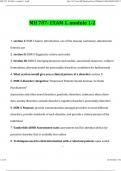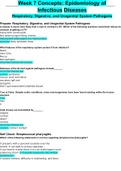Exam (elaborations)
MH 707- EXAM 1. Module 1-2 - 2024 Questions and Answers Latest (2024 / 2025) (Verified Answers)
- Course
- Institution
MH 707- EXAM 1. Module 1-2 - 2024 Questions and Answers Latest (2024 / 2025) (Verified Answers) section 1: DSM-5 basics: introduction, use of the manual, cautionary statementon forensic use 2. section II: DSM-5 diagnostic criteria and codes 3. Section III: DSM-5 emerging measures and models, ass...
[Show more]




